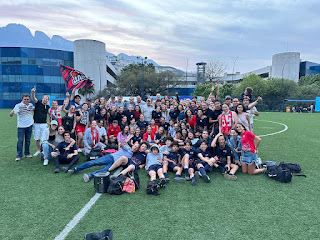Healthy bonding in relationships / Vinculación sana en las relaciones de pareja
As human beings grow, they develop countless meaningful bonds in their lives.
When we are little, the bond is established
with our primary caregivers, usually our parents, who give us the richest links
in our lives since the following future links will depend on this link and its
characteristics.
As children grow, other figures become important
in their lives, other adults in the family, teachers and their peers. The
relationship with their peers or equals arises as a way of companionship and
friendship and this is how people learn and continue practicing virtues such as
empathy, sincerity, respect, affection; among others.
During adolescence, boys begin to explore and
get to know their peers through attraction, starting with their first
experiences of dating or romantic relationships.
Relationships are a bond based on interest and
affection. It is when two people, by mutual agreement, decide to share time
together. Like any bond, dating requires commitment and care for others and for
oneself.
According to this, young people in adolescence
should know and recognize some signs of a toxic or harmful relationship, in
order to also recognize a healthy relationship for their growth. In this way,
we will mention some red flags of how it looks like when we are in a harmful
relationship:
- Ghosting: When someone partially or completely distances themselves from the other person without warning or explanation or for no apparent reason, leaving the other person with a feeling of uncertainty and anxiety that in turn brings with it guilt.
- Gaslighting: It is a type of manipulation, it consists of making the other person believe that their judgment is wrong, making them question their own thoughts and feelings and distrust their intuition. It is a very common and normalized type of emotional abuse for the victim.
- Emotional manipulation: This can come in three ways: generating guilt in the victim, aggression and causing fear in the victim and the last one, in the form of gifts.
It is of utmost importance for adolescents to
become familiar with these abusive behaviors because If young people know what
“bad treatment” means, it will be easier for them to recognize, in turn, a
healthy relationship based on the feeling of worth, acceptance, respectful and
assertive communication and the much-named “affective responsibility” that
consists in taking charge of myself, my actions, my emotions; without waiting
for the other to change to satisfy my needs.
The psychologists at Student Support Services
at JFK School are at your service if you would like to come and talk about more
ways to recognize an abusive relationship and be able to find healthier ways to
establish relationships.
María Fernanda Covarrubias & Rocío
Aguirre MS COUNSELORS
----------------------------------------------------------
A medida que los seres humanos
crecen, desarrollan un sin número de vínculos significativos en su vida.
Cuando somos pequeños, el vínculo
establecido con sus cuidadores primarios, normalmente papá y mamá; son los
vínculos más importantes y de más riqueza en nuestra vida ya que de éste y sus
características, dependerán los siguientes vínculos futuros.
Conforme los niños crecen, otras
figuras cobran importancia en su vida, otros adultos de la familia, maestros y
sus pares. La relación con sus pares o iguales surge a manera de compañerismo y
amistad y gracias a ella; las personas aprendemos y seguimos practicando
virtudes como la empatía, la sinceridad, el respeto, el cariño; entre
otras.
Durante la adolescencia, los
chicos comienzan a explorar y conocer desde la atracción a sus iguales,
iniciando con sus primeras experiencias de noviazgo o de vínculo amoroso para
así continuar, si así lo desean, en su etapa adulta.
Las relaciones de pareja, son un
vínculo basado en el interés y el afecto, donde dos personas en común acuerdo,
deciden compartir un tiempo juntos. Como todo vínculo, el noviazgo requiere
compromiso y cuidado del otro y de uno mismo.
Es por eso que, los jóvenes en la
adolescencia que comienzan una relación de noviazgo, deben de conocer algunas
señales de una relación tóxica o dañina, para a su vez, reconocer una relación
sana y óptima para su crecimiento. De esta manera, mencionaremos algunas
“red flags” o señales de precaución al estar en una relación dañina:
- Ghosting: Este término hace referencia a cuando en una relación, una de las personas comienza a mostrarse fría o se aleja parcial o totalmente de la otra persona sin advertencia ni explicación o sin motivo aparente, dejando a la otra persona con un sentimiento de incertidumbre y ansiedad que a su vez trae consigo la culpa.
- Gaslighting: Es un tipo de manipulación, consiste en hacer creer a la otra persona que su criterio está mal, que se cuestione sus propios pensamientos, sentimientos y que desconfíe de su intuición. Es un tipo de abuso emocional muy común y normalizado para la víctima.
- Manipulación emocional: Esta puede venir en tres maneras: generando culpa en la víctima, de agresión y causando miedo en la víctima o en forma de regalos, es decir, usar promesas para mantener a la persona cerca y pensando en que la relación cambiará a algo más positivo.
Es de suma importancia para los
adolescentes, familiarizarse con estas conductas de abuso y poder así,
identificarlas en sus relaciones de amistad y en su caso, de noviazgo. Si los
jóvenes conocen lo que significa un “mal trato”, será más fácil para ellos
reconocer, a su vez, una relación sana basada en el sentimiento de valía, aceptación,
comunicación respetuosa y asertiva y la muy nombrada “responsabilidad afectiva”
que consiste en hacerme cargo de mí mismo, mis acciones, mis emociones; sin
esperar que el otro cambie para satisfacer mis necesidades.
Las psicólogas de Student Support
Services del colegio JFK quedamos a sus órdenes si gustan acercarse a platicar
de más maneras de reconocer una relación abusiva y poder encontrar maneras más
saludables de entablar relaciones.
María Fernanda Covarrubias y Rocío
Aguirre, MS COUNSELORS




Comments
Post a Comment